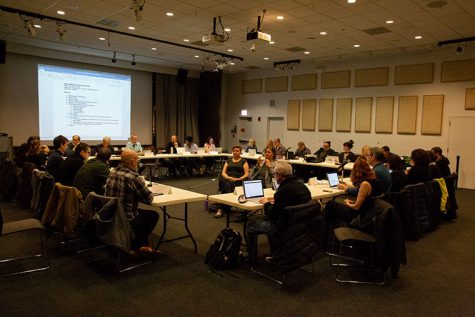Faculty Senate to review and edit ‘vague’ bylaws
February 17, 2020

The Faculty Senate is preparing to review its bylaws to clarify expectations and procedures for future senators ahead of their 2020 elections.
During their Friday, Feb. 14 meeting, the Faculty Senate voted unanimously in favor of convening an ad-hoc “Faculty Senate Bylaws Committee,” where senate members will review current bylaws and propose revisions to be made.
Faculty Senate President Sean Johnson Andrews, an associate professor in the Humanities, History and Social Sciences Department, said during the meeting the committee will aim to complete their review by April 17, 2020, so changes can be sent to the college’s Board of Trustees during the summer.
Faculty Senate Secretary Christopher Shaw, an associate professor in the Science and Mathematics Department, said the main focus of the upcoming revisions will be setting guidelines for how the Faculty Senate runs elections. Senatorial elections are scheduled for April 2020, with a self-nomination process scheduled to be completed by March in order for the new senate to convene for the final meeting of the spring semester Friday, May 8.
“In our particular case … we’re looking into how we elect officers into the senate,” Shaw said in an interview with the Chronicle. “Historically, those elections have been done differently every year. What that essentially means is there’s some room for interpretation in the present bylaws about how we do it.”
As Faculty Senate secretary, Shaw said he looked to the bylaws for guidance while organizing elections and found they did not instruct him on precisely what to do. This confusion caused senate members to push for more specific language in the document.
Terms for department senators last two years. When faculty are reelected, they may also be re-elected to leadership positions on the senate. Three seats on the Executive Committee will be up for election in April, with three additional members’ terms not yet finished, according to Shaw.
Shaw’s term ends this semester, so he said it is important future senators have clear and direct instruction for electoral procedures that may need to be referred to in the future.
In the current version of the Faculty Senate’s bylaws, approved Friday, Dec. 8, 2017, the section regarding elections only contains two statements: the Executive Committee “shall conduct all senatorial elections,” and they “shall administer and keep election results and records,” offering little information for future committee members tasked with running elections.
During the meeting, Shaw pointed out discrepancies between how often the Faculty Senate adds new members and how large the senate actually needs to be.
The Faculty Senate’s bylaws state: “[The] Executive Committee will review the number of faculty per department both prior to spring elections and at the start of the academic year to ensure the Senate seats 33–36 Senators.”
Currently, there are 22 department senators on Faculty Senate. The remaining members are school-wide at-large senators, along with a chairs’ council and a graduate council representative.
“[The bylaws] say every year the executive committee will look at the size of each department in the college and decide whether or not we want to add additional senators,” Shaw said. “But it only applies to departmental senators, [who] are only elected every other year.”
Shaw said maintaining a static number of senators does not make sense as “the number of full-time faculty at the college is going down.”







